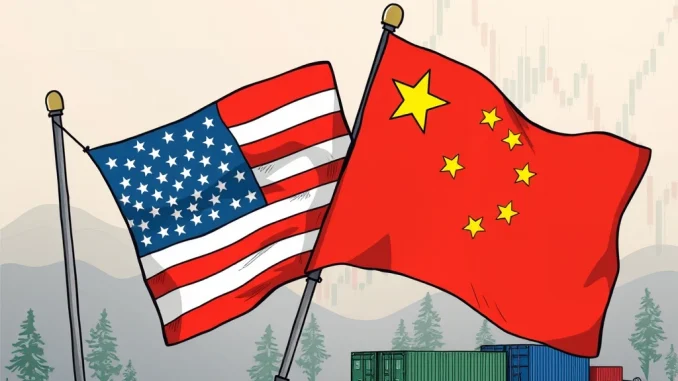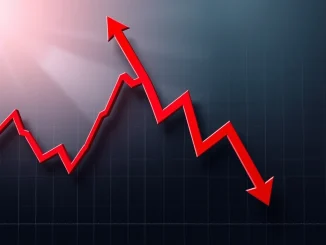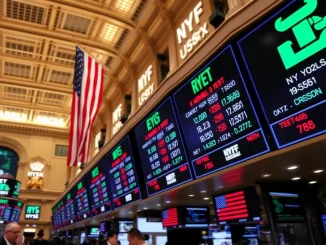
For those navigating the dynamic world of cryptocurrency, news about seemingly distant trade policies might not always grab immediate attention. However, decisions regarding significant global economic relationships, such as those between the United States and China, have a ripple effect that can certainly influence the broader financial landscape, including the cryptocurrency market. Understanding these macro shifts is key to a holistic investment perspective.
White House Confirms Stance on US-China Tariffs
In a recent statement that underscores the current administration’s approach to international trade, White House Press Secretary Karoline Leavitt confirmed there are no plans for a unilateral reduction in US-China tariffs. This position was articulated during a Fox News interview and subsequently highlighted by economic news accounts like Walter Bloomberg on X.
This declaration provides clarity on a topic that has been a subject of speculation for some time. Businesses, consumers, and investors alike have been watching for potential shifts in the tariff landscape that was largely established during the previous administration. The decision signals a continuation of a firm stance in trade negotiations with Beijing.
The Lingering Shadow of the Trade War
The term “trade war” became synonymous with the economic relationship between the US and China starting in 2018, when significant tariffs were first imposed on billions of dollars worth of goods from both countries. The stated goals behind these tariffs included addressing trade imbalances, protecting domestic industries, and compelling changes in China’s trade practices related to intellectual property and technology transfer.
While phases of negotiation and limited agreements have occurred since then, a substantial portion of these tariffs remains in place. The White House’s recent statement indicates that any future adjustments are unlikely to be one-sided; they would likely be part of broader, reciprocal negotiations.
Understanding the White House Policy
Why would the White House policy explicitly rule out unilateral tariff cuts? Several factors likely play into this decision:
- Negotiating Leverage: Tariffs are often viewed as a key piece of leverage in ongoing trade discussions. Removing them without reciprocal concessions from China would diminish the US’s bargaining position.
- Political Considerations: Maintaining tariffs can be seen domestically as a strong stance against perceived unfair trade practices, appealing to certain political bases.
- Addressing Core Issues: The administration may believe that the underlying issues that led to the tariffs (like intellectual property theft or state subsidies) have not been sufficiently resolved, necessitating the tariffs’ continuation as a tool to push for structural changes.
- Economic Impact Assessment: While tariffs have costs, the administration might assess that the strategic benefits or the potential negative consequences of unilateral removal outweigh the benefits of a solo reduction.
This approach suggests a preference for a comprehensive agreement rather than piecemeal, unreciprocated actions.
Exploring the Economic Impact
The continuation of these tariffs has a tangible economic impact on various sectors and stakeholders:
For Businesses:
- Increased costs for importing goods from China, impacting supply chains.
- Need to find alternative suppliers or absorb costs, potentially affecting profitability.
- Uncertainty about future trade policy complicates long-term planning.
For Consumers:
- Potentially higher prices for imported goods as businesses pass on tariff costs.
- Reduced variety of products available if certain imports become too expensive.
On Global Trade:
- Disruption of established trade flows and patterns.
- Encouragement of manufacturing shifts away from China to other countries (supply chain diversification).
- Contribution to global economic uncertainty.
The decision reinforces that these economic pressures will persist unless a bilateral agreement is reached.
Connecting to the Cryptocurrency Market
How does this seemingly traditional economic news connect with the cryptocurrency market? The link lies primarily in the realm of macroeconomics and investor sentiment.
Macroeconomic Uncertainty: Continued trade tensions contribute to overall global economic uncertainty. In times of uncertainty, investors often reassess their risk exposure. While some might move towards traditional safe havens like gold or certain government bonds, others view Bitcoin and other cryptocurrencies as potential hedges against instability in traditional financial systems or fiat currencies.
Inflation and Supply Chains: Tariffs can be inflationary as they increase the cost of goods. Persistent inflation is a factor that some investors believe makes scarce assets like Bitcoin more attractive as a store of value.
Geopolitical Risk: The US-China relationship is a major geopolitical axis. Heightened tension or lack of resolution on key issues can increase geopolitical risk premiums across markets. Some crypto investors see decentralized assets as less susceptible to the direct control or political maneuvering that can affect traditional assets.
Capital Flows: While harder to track directly, changes in international trade and investment policies can influence global capital flows, which can indirectly impact liquidity and investment levels in various asset classes, including crypto.
While the direct, day-to-day correlation might be debated, the underlying economic and geopolitical currents influenced by decisions like maintaining tariffs are part of the broader environment in which the crypto market operates.
Challenges and Future Outlook
The primary challenge remains finding a path forward that addresses the core trade disagreements between the two economic superpowers. Unilateral action is off the table, meaning any resolution will require complex negotiations, which historically have been protracted and difficult.
The future outlook suggests continued trade friction unless significant concessions are made by one or both sides. This persistence of tension and uncertainty is a factor that market participants, including those in the cryptocurrency space, will need to continue monitoring.
Actionable Insights for Crypto Enthusiasts
Given that macro events like trade policy can influence market sentiment, what should crypto investors consider?
- Stay Informed: Pay attention to major global economic and geopolitical news, not just crypto-specific headlines.
- Understand Correlation vs. Causation: Recognize that while macro events can influence crypto, the market also has its own unique drivers. Avoid making impulsive decisions based solely on traditional market news.
- Long-Term Perspective: For many, the investment thesis for crypto is based on long-term technological adoption and fundamental shifts, which are less susceptible to short-term trade policy announcements.
- Diversification: Ensure your portfolio strategy aligns with your risk tolerance and investment goals, considering how different asset classes might react to various economic scenarios.
While a single tariff decision won’t make or break the crypto market, it’s a piece of the larger economic puzzle that influences the tides of global finance.
Compelling Summary
The White House has definitively stated it will not unilaterally reduce tariffs on China, signaling a continuation of the current trade policy stance. This decision, rooted in strategy and negotiation leverage, ensures the lingering effects of the trade war persist, impacting businesses, consumers, and the global economy. While not a direct driver of daily price movements, the resulting economic impact and ongoing uncertainty contribute to the broader macro environment that influences investor sentiment across all markets, including the cryptocurrency market. For crypto investors, this news underscores the importance of monitoring global economic trends as part of a comprehensive market understanding.



